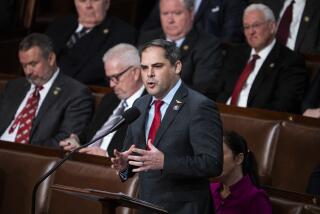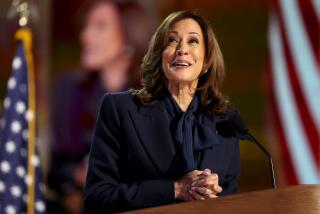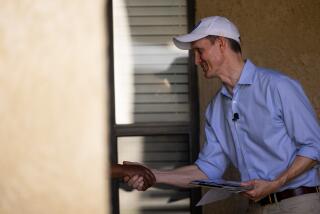Jacobs Gets Air Time to Counter Waite on NBC : Television: Actor’s work triggers equal time for a political challenger on two Southern California stations.
- Share via
If Ralph Waite is a guest star on the episode of “Shannon’s Deal” airing on NBC tonight, can TV appearances by Jeff Jacobs be far behind?
For the second time in as many months, Waite’s work as an actor is triggering federal equal-time rules for Southern California TV stations because he also is running for a congressional seat in Riverside County.
Without waiting to be asked, KNBC Channel 4 invited Jacobs, Waite’s rival for the Democratic nomination in the 37th Congressional District, to be a guest on its public affairs program, “News Conference.” Jacobs has accepted and will be interviewed for approximately 15 minutes--the same amount of time that Waite is on screen in “Shannon’s Deal”--on a show to be broadcast June 3, two days before the primary.
And KMIR Channel 36, the NBC affiliate in Palm Springs, will grant Jacobs free commercial time to offset Waite’s appearance as the detective-hero’s father on “Shannon’s Deal” at 10 tonight.
“I don’t have the latitude (in scheduling) that KNBC has to insert him in a half-hour program, so I’m giving him the commercial time,” KMIR president and general manager John Conte said Monday. “That’s the law, no matter how irrational or unfair it seems.”
Last week, Conte had told The Times that he would not grant Jacobs equal time.
“I don’t see any corollary,” Conte said then. “Ralph Waite played a minor role (on ‘Shannon’s Deal’) and was never identified as a candidate for Congress in this district. I will not grant political time to the guy (Jacobs). It’s just common sense.”
Conte said he changed his mind on the advice of station attorneys.
Under federal law, television and radio stations must provide equal time to opposing candidates whenever a candidate who has qualified for the ballot appears recognizably on a broadcast by either picture, voice, or both, on a broadcast outside of bona fide newscasts, interview programs, documentaries or spot coverage of news events.
Similar cases have resulted in competing candidates being given an amount of air time equal to the time the actor/candidate appeared on screen, not for the entire broadcast in which he appeared.
Tonight’s “Shannon’s Deal” episode marks the third time that a program starring Waite has appeared on a Southern California television station since the actor declared for office March 7.
On March 18, KCBS Channel 2 aired “The Secret Life of John Chapman,” which resulted in Jacobs and fellow candidate Johnny Pearson requesting equal time. The station did not act on the request because neither candidate contacted the station in writing, spokeswoman Lisa DeLucia said.
However, the request does not have to be made in writing, according to Milton Gross, chief of the FCC’s political branch. But Pearson, the first candidate to contact Channel 2 seeking equal time, died March 29 following a massive stroke, and Jacobs declined to pursue the matter further.
On April 19, KCOP Channel 13 broadcast “A Wedding on Walton’s Mountain.” Jacobs requested equal time and was granted it through an appearance on the station’s public-affairs program “A.D.I.”
Bill Emerson, manager of broadcast standards and practices for KNBC, said that he had been notified on March 20 by NBC that Waite’s appearance could have equal time ramifications. He said he then laid out two options to KNBC General Manager John Rohrbeck: offer Jacobs equal time or do not air the “Shannon’s Deal” episode. The decision was made to issue an invitation April 18 for Jacobs to appear on “News Conference.”
Waite could not be reached for comment on the latest equal time decisions. His campaign manager, John Whitehurst, told The Times last month that the equal time rule puts his candidate at a disadvantage because it gives Jacobs a chance to discuss the campaign, whereas Waite is playing dramatic roles.
Rep. Henry A. Waxman (D-Los Angeles) introduced legislation in the early 1980s exempting dramatic appearances from the equal time rule. The bills were not adopted.
Dan Brenner, director of UCLA’s communications law program and a legal adviser to then-Federal Communications Commission Chairman Mark Fowler from 1981 to 1986, argues that acting appearances should be considered under the equal time provision.
“The rule is not as crazy as its sounds,” Brenner said in an interview. “When you deal in political persuasion, the best kind of propaganda is the kind you don’t recognize as propaganda. If an individual is portrayed in a sympathetic role and seeks your vote, the dramatic appearance would more than likely cause you to vote for that person and be more effective than a head-on appeal like a political ad.”
More to Read
Get the L.A. Times Politics newsletter
Deeply reported insights into legislation, politics and policy from Sacramento, Washington and beyond. In your inbox twice per week.
You may occasionally receive promotional content from the Los Angeles Times.








